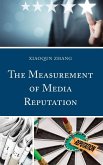Supporting the Military-Affiliated Learner
Communication Approaches to Military Pedagogy and Education
Herausgeber: McDermott, Victoria; May, Amy R.; Hernández, Leandra Hinojosa
Supporting the Military-Affiliated Learner
Communication Approaches to Military Pedagogy and Education
Herausgeber: McDermott, Victoria; May, Amy R.; Hernández, Leandra Hinojosa
- Gebundenes Buch
- Merkliste
- Auf die Merkliste
- Bewerten Bewerten
- Teilen
- Produkt teilen
- Produkterinnerung
- Produkterinnerung
Supporting the Military-Affiliated Learner challenges the academic community to 1) reevaluate how they support military-affiliated learners (MALs) and address how the military-civilian-academic divide causes disparities and 2) implement programs and develop strategies to facilitate equitable academic integration from application to graduation.
Andere Kunden interessierten sich auch für
![Military Spouses with Graduate Degrees Military Spouses with Graduate Degrees]() Military Spouses with Graduate Degrees135,99 €
Military Spouses with Graduate Degrees135,99 €![Technologies for Supporting Reasoning Communities and Collaborative Decision Making Technologies for Supporting Reasoning Communities and Collaborative Decision Making]() Technologies for Supporting Reasoning Communities and Collaborative Decision Making195,99 €
Technologies for Supporting Reasoning Communities and Collaborative Decision Making195,99 €![Mobility Supporting Schemes over IPv6 Networks Mobility Supporting Schemes over IPv6 Networks]() Riaz KhanMobility Supporting Schemes over IPv6 Networks27,95 €
Riaz KhanMobility Supporting Schemes over IPv6 Networks27,95 €![Women of the Wild Women of the Wild]() Women of the Wild145,99 €
Women of the Wild145,99 €![The Measurement of Media Reputation The Measurement of Media Reputation]() Xiaoqun ZhangThe Measurement of Media Reputation120,99 €
Xiaoqun ZhangThe Measurement of Media Reputation120,99 €![The Ethics of Listening The Ethics of Listening]() Elizabeth S. ParksThe Ethics of Listening142,99 €
Elizabeth S. ParksThe Ethics of Listening142,99 €![Communication Research in the Big Data Era Communication Research in the Big Data Era]() Xiaoqun ZhangCommunication Research in the Big Data Era129,99 €
Xiaoqun ZhangCommunication Research in the Big Data Era129,99 €-
-
-
Supporting the Military-Affiliated Learner challenges the academic community to 1) reevaluate how they support military-affiliated learners (MALs) and address how the military-civilian-academic divide causes disparities and 2) implement programs and develop strategies to facilitate equitable academic integration from application to graduation.
Hinweis: Dieser Artikel kann nur an eine deutsche Lieferadresse ausgeliefert werden.
Hinweis: Dieser Artikel kann nur an eine deutsche Lieferadresse ausgeliefert werden.
Produktdetails
- Produktdetails
- Verlag: Lexington Books
- Seitenzahl: 458
- Erscheinungstermin: 10. Dezember 2020
- Englisch
- Abmessung: 235mm x 157mm x 31mm
- Gewicht: 889g
- ISBN-13: 9781793618085
- ISBN-10: 1793618089
- Artikelnr.: 60152335
- Herstellerkennzeichnung
- Libri GmbH
- Europaallee 1
- 36244 Bad Hersfeld
- gpsr@libri.de
- Verlag: Lexington Books
- Seitenzahl: 458
- Erscheinungstermin: 10. Dezember 2020
- Englisch
- Abmessung: 235mm x 157mm x 31mm
- Gewicht: 889g
- ISBN-13: 9781793618085
- ISBN-10: 1793618089
- Artikelnr.: 60152335
- Herstellerkennzeichnung
- Libri GmbH
- Europaallee 1
- 36244 Bad Hersfeld
- gpsr@libri.de
Victoria McDermott is an instructor at the University of Maryland. Leandra H. Hernández is assistant professor in the Department of Communication at Utah Valley University. Amy May is assistant professor in the Department of Human Communication Studies at Shippensburg University.
Introduction: The Current Status of MALs in Higher Education, Victoria
McDermott, Leandra Hinojosa Hernández, and Amy May
Part I: Exploring MAL Identities
Chapter 1: Setting the Stage: MALs in Higher Education, Victoria McDermott,
Margaret Stewart, Carol Walker, Amy May, and Leandra Hernández
Chapter 2: Understanding Dual Identity Formation: Identifying Commonalities
and Resolving "Differentness" For Military Affiliated Learners, Amy May and
Victoria McDermott
Chapter 3: What is Impacting the Military-Affiliated Learner Experience in
Higher Education, Nancy A. Chiara, Michael Chiara, and Mary Z. Ashlock
Chapter 4: Supporting Military Veterans in the Graduate Classroom: A Case
Study of Political Beliefs And Discussion, William T. Howe Jr.
Chapter 5: Challenges for Military Partners Pursuing College and
Resilience-Based Strategies to Support their Academic Success, Kelly R.
Rossetto and Jennifer S. Owlett
Part II: Educators and Support Staff Experiences with MALs
Chapter 6: Speaking Chicana/o Secrets to Military Students: An
Autoethnography of Teaching Senior Military Noncommissioned Officers, Frank
G. Pérez
Chapter 7: Nepantla, Liminality, and Teaching and Learning in the Space
Between: A Borderlands Approach to Military-Affiliated Learner Pedagogy,
Leandra Hinojosa Hernández, Sarah De Los Santos Upton, and Arthur A.
Aguirre
Chapter 8: Supporting the Military-Affiliated Learner's Medical School
Aspirations, Zea Moullet and Jennifer N. Belding
Chapter 9: Nuclear War!: Theorizing the Negative Impacts of Policy Debate's
Tropogical Mistreatment of War for Military-Affiliated Learners, Nick J.
Sciullo
Chapter 10: The Hard Sell: Supporting MALs through Resource Centers, Meghan
Velez, Victoria McDermott, and Kenneth W. Marlin
Part III: Building Inclusive Learning Communities Virtually and Beyond
Chapter 11: Best Practices in Supporting Military-Affiliated Learners:
Suggestions from Communication and Psychological Sciences, Leandra Hinojosa
Hernández and Jennifer N. Belding
Chapter 12: Two-Way Communication as a Constructivist Pedagogy Tool for
Enhancing Meaning Making in Digital Learning Classrooms with Military
Affiliated Learners, April Cobos
Chapter 13: "So We Hit It With a Hammer, and It Worked": How Active-Duty
Marines Communicate, Collaborate, and Forge their Own Learning Communities
in Social Media, Bree McGregor
Chapter 14: Collaborative Apprenticeship Approaches to Writing Instruction
in the Military, Ashley Ludewig
Chapter 15: Adapt and Overcome: Military-Affiliated Learners and Transfer
of Learning, Catherine St. Pierre
Chapter 16: From Application to Graduation: Collective Recommendations for
Serving those Who Serve, Amy May, Victoria McDermott, And Leandra Hinojosa
Hernández
McDermott, Leandra Hinojosa Hernández, and Amy May
Part I: Exploring MAL Identities
Chapter 1: Setting the Stage: MALs in Higher Education, Victoria McDermott,
Margaret Stewart, Carol Walker, Amy May, and Leandra Hernández
Chapter 2: Understanding Dual Identity Formation: Identifying Commonalities
and Resolving "Differentness" For Military Affiliated Learners, Amy May and
Victoria McDermott
Chapter 3: What is Impacting the Military-Affiliated Learner Experience in
Higher Education, Nancy A. Chiara, Michael Chiara, and Mary Z. Ashlock
Chapter 4: Supporting Military Veterans in the Graduate Classroom: A Case
Study of Political Beliefs And Discussion, William T. Howe Jr.
Chapter 5: Challenges for Military Partners Pursuing College and
Resilience-Based Strategies to Support their Academic Success, Kelly R.
Rossetto and Jennifer S. Owlett
Part II: Educators and Support Staff Experiences with MALs
Chapter 6: Speaking Chicana/o Secrets to Military Students: An
Autoethnography of Teaching Senior Military Noncommissioned Officers, Frank
G. Pérez
Chapter 7: Nepantla, Liminality, and Teaching and Learning in the Space
Between: A Borderlands Approach to Military-Affiliated Learner Pedagogy,
Leandra Hinojosa Hernández, Sarah De Los Santos Upton, and Arthur A.
Aguirre
Chapter 8: Supporting the Military-Affiliated Learner's Medical School
Aspirations, Zea Moullet and Jennifer N. Belding
Chapter 9: Nuclear War!: Theorizing the Negative Impacts of Policy Debate's
Tropogical Mistreatment of War for Military-Affiliated Learners, Nick J.
Sciullo
Chapter 10: The Hard Sell: Supporting MALs through Resource Centers, Meghan
Velez, Victoria McDermott, and Kenneth W. Marlin
Part III: Building Inclusive Learning Communities Virtually and Beyond
Chapter 11: Best Practices in Supporting Military-Affiliated Learners:
Suggestions from Communication and Psychological Sciences, Leandra Hinojosa
Hernández and Jennifer N. Belding
Chapter 12: Two-Way Communication as a Constructivist Pedagogy Tool for
Enhancing Meaning Making in Digital Learning Classrooms with Military
Affiliated Learners, April Cobos
Chapter 13: "So We Hit It With a Hammer, and It Worked": How Active-Duty
Marines Communicate, Collaborate, and Forge their Own Learning Communities
in Social Media, Bree McGregor
Chapter 14: Collaborative Apprenticeship Approaches to Writing Instruction
in the Military, Ashley Ludewig
Chapter 15: Adapt and Overcome: Military-Affiliated Learners and Transfer
of Learning, Catherine St. Pierre
Chapter 16: From Application to Graduation: Collective Recommendations for
Serving those Who Serve, Amy May, Victoria McDermott, And Leandra Hinojosa
Hernández
Introduction: The Current Status of MALs in Higher Education, Victoria
McDermott, Leandra Hinojosa Hernández, and Amy May
Part I: Exploring MAL Identities
Chapter 1: Setting the Stage: MALs in Higher Education, Victoria McDermott,
Margaret Stewart, Carol Walker, Amy May, and Leandra Hernández
Chapter 2: Understanding Dual Identity Formation: Identifying Commonalities
and Resolving "Differentness" For Military Affiliated Learners, Amy May and
Victoria McDermott
Chapter 3: What is Impacting the Military-Affiliated Learner Experience in
Higher Education, Nancy A. Chiara, Michael Chiara, and Mary Z. Ashlock
Chapter 4: Supporting Military Veterans in the Graduate Classroom: A Case
Study of Political Beliefs And Discussion, William T. Howe Jr.
Chapter 5: Challenges for Military Partners Pursuing College and
Resilience-Based Strategies to Support their Academic Success, Kelly R.
Rossetto and Jennifer S. Owlett
Part II: Educators and Support Staff Experiences with MALs
Chapter 6: Speaking Chicana/o Secrets to Military Students: An
Autoethnography of Teaching Senior Military Noncommissioned Officers, Frank
G. Pérez
Chapter 7: Nepantla, Liminality, and Teaching and Learning in the Space
Between: A Borderlands Approach to Military-Affiliated Learner Pedagogy,
Leandra Hinojosa Hernández, Sarah De Los Santos Upton, and Arthur A.
Aguirre
Chapter 8: Supporting the Military-Affiliated Learner's Medical School
Aspirations, Zea Moullet and Jennifer N. Belding
Chapter 9: Nuclear War!: Theorizing the Negative Impacts of Policy Debate's
Tropogical Mistreatment of War for Military-Affiliated Learners, Nick J.
Sciullo
Chapter 10: The Hard Sell: Supporting MALs through Resource Centers, Meghan
Velez, Victoria McDermott, and Kenneth W. Marlin
Part III: Building Inclusive Learning Communities Virtually and Beyond
Chapter 11: Best Practices in Supporting Military-Affiliated Learners:
Suggestions from Communication and Psychological Sciences, Leandra Hinojosa
Hernández and Jennifer N. Belding
Chapter 12: Two-Way Communication as a Constructivist Pedagogy Tool for
Enhancing Meaning Making in Digital Learning Classrooms with Military
Affiliated Learners, April Cobos
Chapter 13: "So We Hit It With a Hammer, and It Worked": How Active-Duty
Marines Communicate, Collaborate, and Forge their Own Learning Communities
in Social Media, Bree McGregor
Chapter 14: Collaborative Apprenticeship Approaches to Writing Instruction
in the Military, Ashley Ludewig
Chapter 15: Adapt and Overcome: Military-Affiliated Learners and Transfer
of Learning, Catherine St. Pierre
Chapter 16: From Application to Graduation: Collective Recommendations for
Serving those Who Serve, Amy May, Victoria McDermott, And Leandra Hinojosa
Hernández
McDermott, Leandra Hinojosa Hernández, and Amy May
Part I: Exploring MAL Identities
Chapter 1: Setting the Stage: MALs in Higher Education, Victoria McDermott,
Margaret Stewart, Carol Walker, Amy May, and Leandra Hernández
Chapter 2: Understanding Dual Identity Formation: Identifying Commonalities
and Resolving "Differentness" For Military Affiliated Learners, Amy May and
Victoria McDermott
Chapter 3: What is Impacting the Military-Affiliated Learner Experience in
Higher Education, Nancy A. Chiara, Michael Chiara, and Mary Z. Ashlock
Chapter 4: Supporting Military Veterans in the Graduate Classroom: A Case
Study of Political Beliefs And Discussion, William T. Howe Jr.
Chapter 5: Challenges for Military Partners Pursuing College and
Resilience-Based Strategies to Support their Academic Success, Kelly R.
Rossetto and Jennifer S. Owlett
Part II: Educators and Support Staff Experiences with MALs
Chapter 6: Speaking Chicana/o Secrets to Military Students: An
Autoethnography of Teaching Senior Military Noncommissioned Officers, Frank
G. Pérez
Chapter 7: Nepantla, Liminality, and Teaching and Learning in the Space
Between: A Borderlands Approach to Military-Affiliated Learner Pedagogy,
Leandra Hinojosa Hernández, Sarah De Los Santos Upton, and Arthur A.
Aguirre
Chapter 8: Supporting the Military-Affiliated Learner's Medical School
Aspirations, Zea Moullet and Jennifer N. Belding
Chapter 9: Nuclear War!: Theorizing the Negative Impacts of Policy Debate's
Tropogical Mistreatment of War for Military-Affiliated Learners, Nick J.
Sciullo
Chapter 10: The Hard Sell: Supporting MALs through Resource Centers, Meghan
Velez, Victoria McDermott, and Kenneth W. Marlin
Part III: Building Inclusive Learning Communities Virtually and Beyond
Chapter 11: Best Practices in Supporting Military-Affiliated Learners:
Suggestions from Communication and Psychological Sciences, Leandra Hinojosa
Hernández and Jennifer N. Belding
Chapter 12: Two-Way Communication as a Constructivist Pedagogy Tool for
Enhancing Meaning Making in Digital Learning Classrooms with Military
Affiliated Learners, April Cobos
Chapter 13: "So We Hit It With a Hammer, and It Worked": How Active-Duty
Marines Communicate, Collaborate, and Forge their Own Learning Communities
in Social Media, Bree McGregor
Chapter 14: Collaborative Apprenticeship Approaches to Writing Instruction
in the Military, Ashley Ludewig
Chapter 15: Adapt and Overcome: Military-Affiliated Learners and Transfer
of Learning, Catherine St. Pierre
Chapter 16: From Application to Graduation: Collective Recommendations for
Serving those Who Serve, Amy May, Victoria McDermott, And Leandra Hinojosa
Hernández








